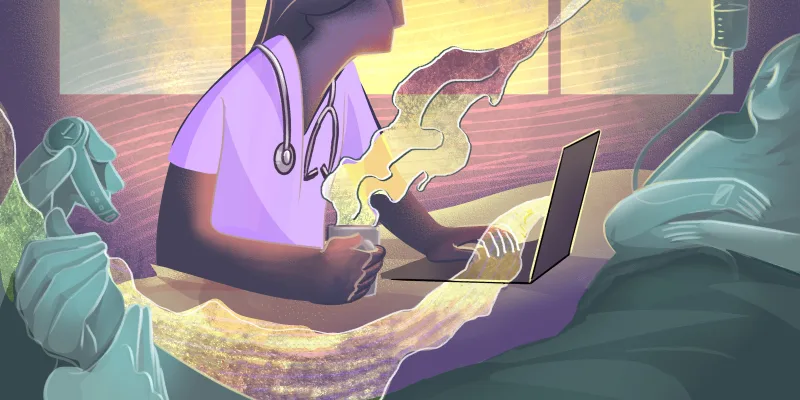
Watching the TV news, we see COVID-19 survivors being rolled out in a wheelchair as they are discharged from the hospital, applauded by a cheering crowd. “They’ve recovered!” the reporter announces happily. It is a hopeful sign for everyone who fears this virus. For health care workers, the ritual stokes the fires of fulfillment one feels when they know they have saved a life. Yet, my inner cynic wonders if the hospital marketers aren't exploiting the moment just a little for a nice photo-op.
I am a family nurse practitioner working in a community health center, but I do not perceive myself as one of those "front-line workers." I am not risking my own life keeping intubated ICU patients alive or holding the hand of a person who is dying alone. I am not screening long lines of worried people with an uncomfortable nose swab test. I am a PCP. For my coworkers and me, life is upended, but not terribly so. Counterintuitively, we do not allow face-to-face appointments for persons with coughs and fevers. Callers are vetted by telephonic triage to see if they meet the criteria for COVID-19 testing and advice. Clinic arrivals are screened in the parking lot to make sure they are well enough to enter.
It all seems so backward.
Everyone is familiar with the phrase "follow-up with your PCP." The PCP is ground zero, the medical home where one returns after being displaced from somewhere else — the ER, the hospital, a specialist. The door where the responsibility for your preventive, acute, and chronic illnesses converge. And thus, where the post-COVID-19 survivors go once they are declared “recovered.”
But have these patients really recovered? As I call my COVID-19 patients for their follow-up checks, I have noticed something new and worrisome, a post-COVID-19 list of needs, what might be called "post-COVID-19 survivorship." Survivorship is a term usually reserved for cancer patients, a process of living with and after treatment, often with uncertainty and life-changes. But it has never seemed more applicable to an emerging pattern of physical and psychological sequelae my peers and I are hearing about.
Poor appetite? Check. Sleep issues? Check. Chronic pain? Check. Emotional changes? Check. Check. Check. "Why does my leg hurt? Could it be a blood clot?” "I was on blood thinners in the hospital. Should I be on them now?" “How will I find the energy to go to work? My boss says a month off is plenty, and I need to go back.” “Why am I coughing? Do I still have pneumonia?” “When should I get another chest X-ray?” “When will I smell again?” “Will my taste buds come back?” “I have a rash! What does this mean?”
In addition to the clinical ambiguities, surviving a pandemic comes with its share of uncompensated paperwork. Patients request letters for their employers documenting they are not contagious. Others need FMLA forms completed that demand precise predictions of the follow-up plan. Insurance companies want documentation confirming disability.
Sadly, and frustratingly, there are no answers yet. “It’s a new infection,” I tell my patients. “We are learning as we go.” Reassurance seems to help. And not help. With every patient story of survivorship shared, we learn more about the recovery process. And I worry also. When will it be safe to allow the COVID-19 survivor back in the clinic? Back to work? Do I rely on the antibody test? I worry about my liability. What if I sign this form and the infection recurs and they infect someone else?
I ponder the role of the PCP in this pandemic. After the field hospitals close, and the daily TV briefings wrap up, PCPs will still be there keeping all afloat. We are like the captains on a life raft evacuating those from a shipwreck to safety. And sometimes, the survivorship journey to shore is choppy and sometimes smooth. It might be a quick trip or a long voyage. And without a map or GPS, we must navigate as we travel. But it is especially important that we stay buoyant too, for every lifeboat has its capacity.
Godspeed PCPs.
Denise Bockwoldt is a family nurse practitioner at an FQHC near Chicago, and a clinical assistant professor of nursing at the University of IL, Chicago.
Click here to see more perspectives on COVID-19 from the Doximity network.
Click here for up-to-date news about COVID-19 on Doximity.
Illustration by Jennifer Bogartz




